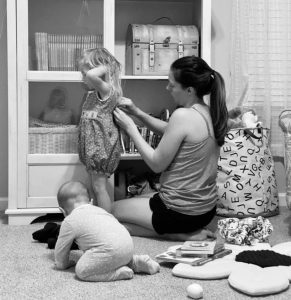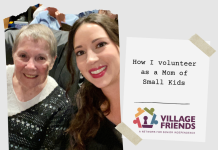I came across Janet Lansbury’s respectful parenting method through a “suggested article” on Facebook. Sometimes those creepy algorithms are actually useful. I don’t remember which article it was, but I was immediately intrigued. My daughter is a smart and very strong-willed three year old. I began to have trouble with her behavior last year when she was two years old, and I was pregnant with her brother. I was tired, socially isolated, and frustrated that she seemed to be testing every nerve I possessed and then creating new ones to test. We were easily pulled into a pattern where she wouldn’t listen to a direction or would get into something she knew she wasn’t supposed to, I would ask her multiple times to stop, she wouldn’t listen, I would yell, she still wouldn’t listen, and I would have to go physically stop her from doing whatever it was, and I will admit that I wasn’t always gentle. I could feel the power struggle coming on every day as I attempted to make her do what I wanted her to do or stop doing what I didn’t want her to do. I was turning into a mom that I did not like. I was on a hair pin trigger and whatever reserves of patience I once had were fully empty. Everything was a battle. Getting dressed, eating meals, washing hands, picking up toys, getting bathed, brushing teeth, even picking out books to read before bed. I was exhausted and desperately needed help.

The respectful parenting perspective was radically different from anything I’d heard before, but it made so much intuitive sense to me. I found Janet Lansbury’s podcast, Respectful Parenting: Janet Lansbury Unruffled, and binged old episodes (I play them on 1.5x speed because she has a very lovely voice, but speaks slowly, and I’m short on quiet time). I bought and read her books No Bad Kids: Toddler Discipline Without Shame and Elevating Child Care: A Guide to Respectful Parenting. The first book jumped out at me because of the shame piece. I struggle with shame and it affects my relationships every day. If there was a way for me to raise my children without passing that on, I was going to try it.
The premise of respectful parenting is remarkably simple: children are fully formed people and we should treat them that way from birth. A child’s job is to find and test limits in their pursuit of becoming their own person separate from their parents. Janet’s methods revolve almost entirely around shifting your perspective as a parent from trying to control your children to helping them grow by giving them clear, consistent boundaries. All emotional expressions are encouraged and supported, and punitive discipline is avoided. After trying this approach since the beginning of the year, here’s what has happened:
- I changed my perspective on my job as ‘Mom’ from controlling behavior—making my kids do what I want—to helping them get unstuck from their impulses. Understanding developmental stages, particularly my daughter’s, helped me adjust my expectations of her and become less frustrated when she did something that 3 year olds do. I realized that I was expecting her to act like a little adult—a compliant one at that—and not like a child who is easily overwhelmed by her emotions and impulses. Reframing her outbursts or “misbehaviors” in that way allowed me to keep calm, set boundaries, let her express her emotions, and help her get unstuck from impulses. I particularly like Janet’s word: Unruffled. I repeat it to myself when things start going south. I imagine that I am in my own personal bubble of tranquility, and that nothing my kids throw at me can ruffle me. I am “effortlessly in charge” as Janet would say.
- I changed the language I use with my kids. Janet suggests not using the third person and royal “we” and instead use first person pronouns to connect to your children as people. It took a lot of practice, but now I use the pronouns “I” and “me” instead of referring to myself as “mommy.” Instead of saying “we don’t hit” or “we don’t throw toys,” I say “I won’t let you hit your brother” or “I don’t want you throwing toys.” I was shocked at how ingrained it was in me to constantly call myself “mommy” or say “we” do or don’t do things. I am also trying to remove language that imposes my adult value judgement on what my kids say or do. I’ve been practicing replacing “good job!” with “wow, you did it!” and “good idea!” with something like “interesting!”. And for negative things, replacing “that was not nice” with “you are frustrated about that, but I won’t let you hit me.”

- All feelings are welcome. I’ve learned to recognize the feeling first, then set the boundary. Our biggest challenge right now is my daughter getting angry at her brother for touching her toys or otherwise getting in her way and pushing, kicking, or headbutting him. Instead of punishing her or using shaming language, I acknowledge that she’s upset and having a hard time with him being around, and then set the boundary of not hurting him. For example, I might say, “I see you’re really angry at your brother right now. He’s touching your toys, and you don’t want him to. Being a big sister can be really difficult. I won’t let you hit him, because it could hurt him.” Usually she agrees that being a big sister is really hard and that she is upset with him. But after hearing that I understand her and I’m not rejecting her for her feelings, she typically moves on to another activity quickly.
- I set personal boundaries before I get annoyed. I LOVE cuddling with my kids and playing tickle games and blowing raspberries, but sometimes I get touched out and need a break. I realized that I had been feeling guilty about setting touch boundaries (kids need affection, right?) so I was letting my kids touch me and play on me to the point that I was getting really angry and it was spoiling my mood—sometimes for hours. I want to teach my children about bodily autonomy, but I need to practice what I preach. I’ve let go of guilt in this area, and instead, I’m modeling what it looks like to set personal boundaries for my body. If I don’t want my kids using me as a jungle gym anymore or I’ve taken one too many tiny elbows to the gut, I’m comfortable saying, “I’m done playing like this for now, please find something else to do” or “This type of play is hurting me. I’m not going to let you touch me like that.”
- I feel much closer to my daughter. We’ve both become more affectionate with each other, and she wants me to do more things with her and for her (sometimes over her daddy!). I realized that consciously or subconsciously, I had been withdrawing affection and attention as punishment when I was frustrated with her. Since lack of attention and feeling unheard was usually the cause of her behavior, this punishment was obviously counterproductive. What my daughter really needed was for me to see, accept, and love her regardless of how she was feeling or acting. She needed confirmation that I was going to be in her corner no matter what, and that none of her emotions were too much for me. Since I’ve implemented respectful parenting, my daughter seems more confident in herself and in our relationship. I noticed that she now watches me closely when she’s doing something she’s not sure she’s allowed to do and usually stops when I ask her to or continues if I say nothing or give my approval. Not because she is scared of me, but because she knows I’ve been setting boundaries and that I will physically (but gently) stop her if she is getting stuck in her impulses. She also knows that she can come to me for special “mommy cuddle time” or a hug whenever she wants, and I will make sure I stop and sit down with her at the next available opportunity.
- Our home is more peaceful. Because I feel calmer and more confident in my own decisions, both of my kids can feel confident that I’m in charge and they are safe to play and explore within the confines of set boundaries. Generally, things are going more smoothly and there are fewer fights about basic things like getting dressed in the morning or brushing teeth at night.
- I’m more present. I’ve learned that you really can’t phone in this type of parenting. I have to be present and active in setting boundaries, intervening before behavior becomes enough to make me annoyed or angry, and commenting on feelings. Sometimes this means putting away my phone so it’s not tempting. I’ve cut down on my phone usage, and picked up books more often to show my kids my love of reading. Now my daughter will occasionally ask what I’m reading and want me to read out loud to her, or she will get her own books to read alongside me.

So much of parenting is trial and error, or doing what you’ve seen done before. If I had read about respectful parenting before having kids, I probably would have said it was a little too woo-woo for me. We all know the now-cliche definition of insanity, so sometimes you have to try new things that may initially feel clunky and unnatural. The principles of Janet Lansbury’s work felt right to me immediately, but it took months of practice to make these changes in my perspective, language, and actions. I still have rough days, but overall, the results are undeniable. I can honestly say that finding and implementing Janet Lansbury’s work has changed my entire relationship with my daughter and made me a better, more confident mother to both of my children. There will be no going back for us.











